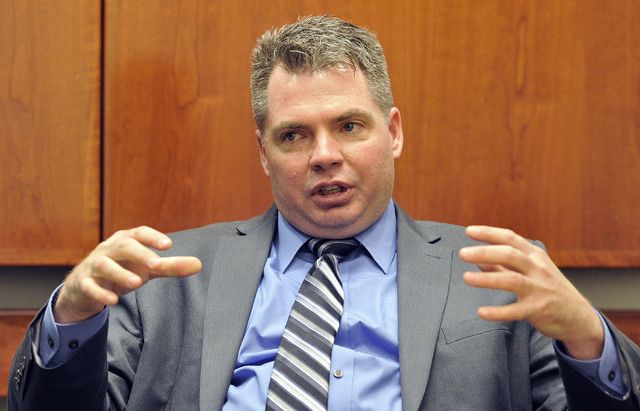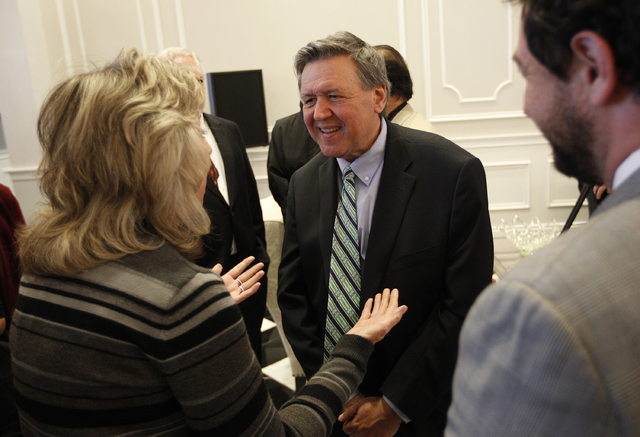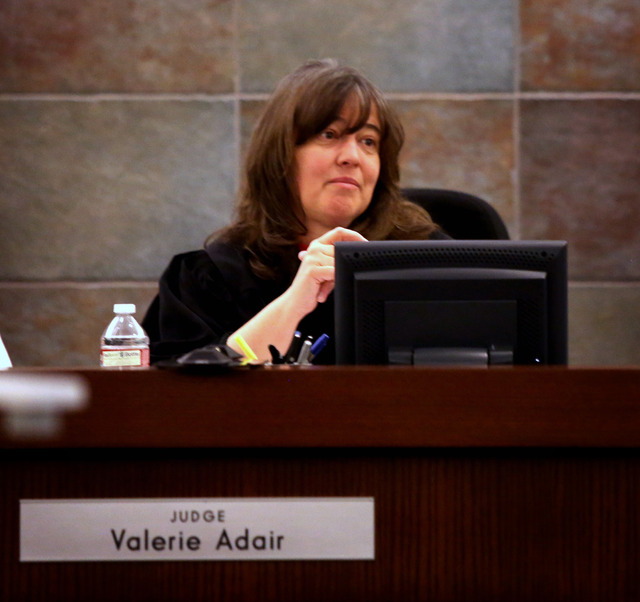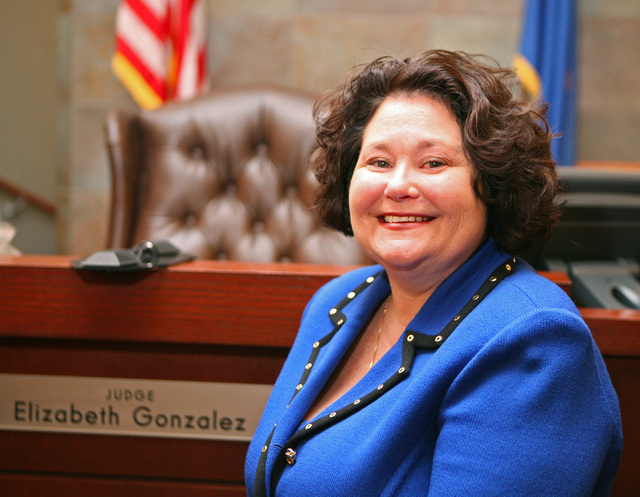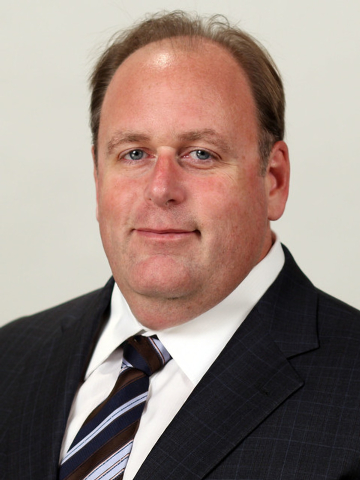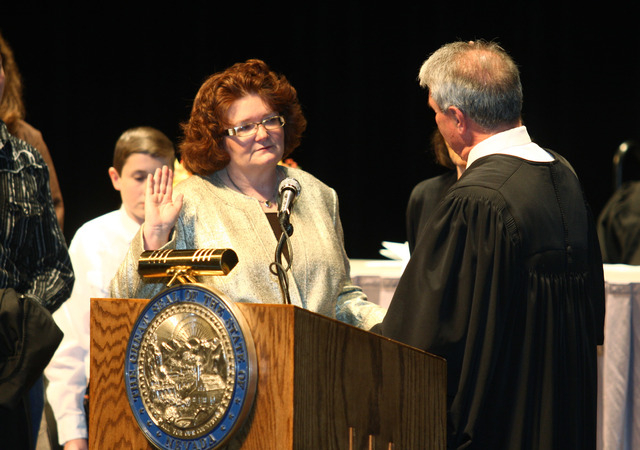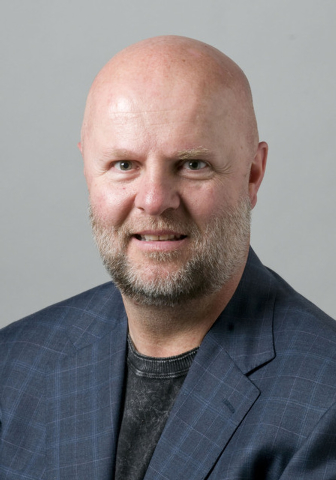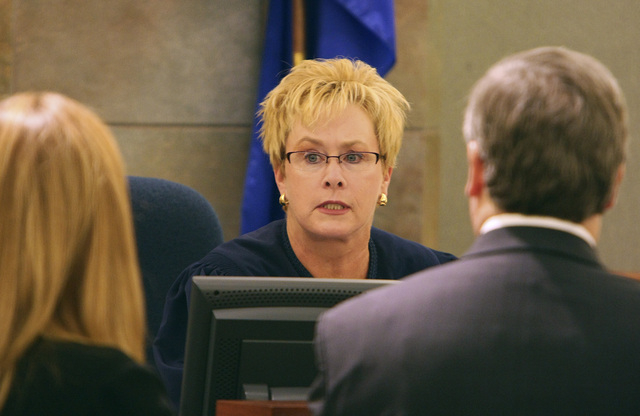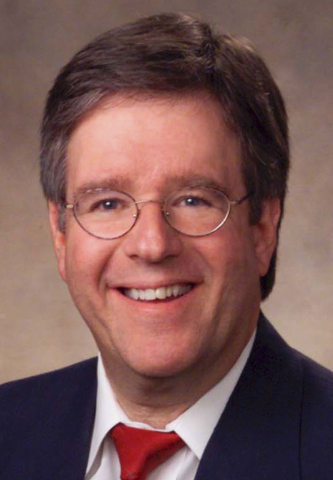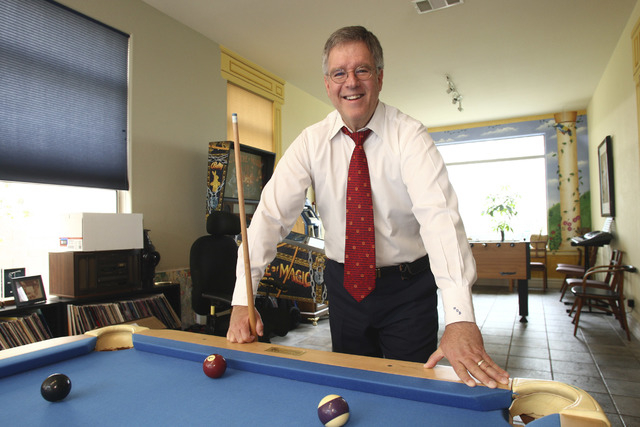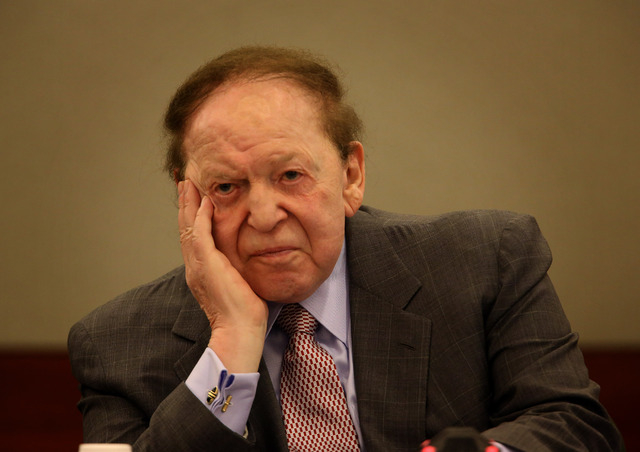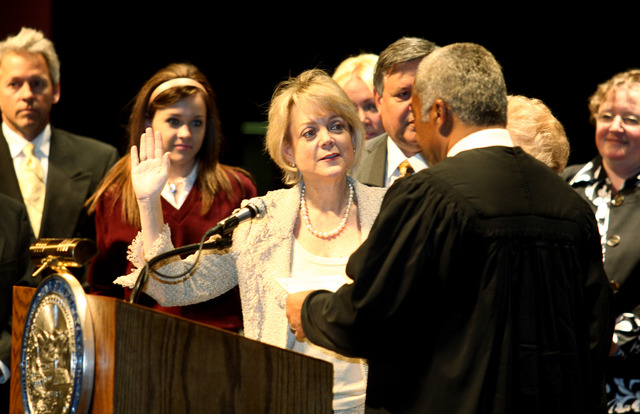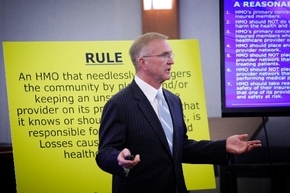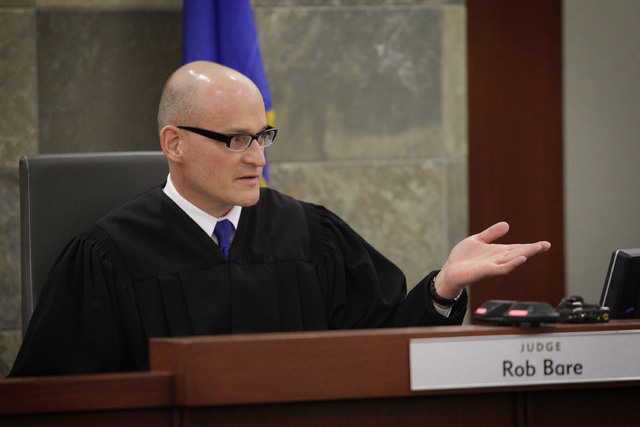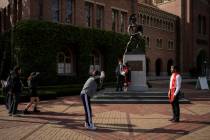Las Vegas candidate’s allegations reveal another side of judiciary races
The final day of filing for judges was exceptionally chaotic this year. People were hopscotching in and out of races. One guy filed three times and ended up running for nothing.
Political consultant David Thomas tried to talk people out of running against the judicial candidates he represents, so they would be automatically elected.
Most of the judicial jockeying and scheming was normal.
Except this year, one judicial candidate, Randall Tindall, accused Thomas in a sworn affidavit of offering him a bribe to withdraw from challenging District Judge Rob Bare and suggesting the Las Vegas attorney run against District Judge Valerie Adair, who is not a Thomas client.
Tindall said Thomas offered to fund the campaign against Adair using the resources of wealthy Las Vegas attorney Robert Eglet.
In separate interviews, Thomas, Eglet and Bare deny the claims Tindall made in a sworn affidavit.
Big bucks in a presidential race is one thing, but in a judicial race it has the appearance of trying to buy justice, or at least a friendly judge, when the monetary sources are attorneys who appear before the judge. Talking people in or out of a judicial race is done all the time, even though in some ways it disenfranchises voters by eliminating choices.
What happened on the last day of filing Jan. 17 was so unusual that one academic said the end result gives more oomph to the idea of merit selection of judges instead of electing them.
Thomas routinely tries to talk people out of running against his clients, including his wife, District Judge Nancy Allf. The man with the reputation as a “judge maker” considers it part of his job. It’s commonplace in presidential races, but the public is less aware of it in judicial races.
Look at Las Vegas Sands Chairman Sheldon Adelson’s funneling millions of dollars into the 2012 presidential race, first to help Newt Gingrich, then to help Mitt Romney. He and his wife spent more than $100 million for those two fruitless efforts and other 2012 campaigns.
A Las Vegas attorney confirmed that an Adelson representative offered to help finance him if he would file to run against District Judge Elizabeth “Betsy” Gonzalez, but he said he refused.
TINDALL’S AFFIDAVIT
Tindall, a first-time candidate, is a defense attorney for Farmers Insurance. He initially planned to run against District Judge Jerry Tao after learning that attorney Chris Rasmussen, who challenged Tao before, was not.
Rasmussen filed first on Jan. 16 against District Judge Elizabeth “Betsy” Gonzalez, a Thomas client, but on the last day switched to District Judge Joanna Kishner, not a Thomas client.
Tindall said he noticed Thomas talking to Rasmussen. “As I was about to sign the final document against Tao, Mr. Rasmussen approached where I was sitting and said that he had just learned something he did not know about Kishner and decided he would withdraw from that race and enter the race against Tao. Since I believed Tao now had an excellent opponent, I decided I would run against a different judge. I chose Rob Bare.”
He chose Bare because he had no challengers “and I have a very low opinion of him as a judge,” Tindall said in an interview March 11.
After Tindall’s name appeared on the candidate board, Thomas was on his cellphone talking and walking in and out of the room, Tindall wrote. “Mr. Thomas then approached me. As he read from his cellphone (or at least gave the impression he was reading from it) he told me the following: ‘Hey, Bob Eglet just texted me and says he doesn’t want anyone running against Rob Bare. So, if you’ll get out of the race against Bare and into the one against Valerie Adair, he says he’ll foot the bill for your campaign.’ ”
Continuing in his affidavit, Tindall wrote that he told Thomas, “You have Bob text that message to my phone, then we’ll talk.”
Tindall was hoping that the text would provide “evidence of what I believed was a bribe.”
He said he thought the bribe was “designed to help keep on the bench a judge that Mr. Eglet believed would be favorable to him and his clients, and to get one off who I suspected he viewed as one unfavorable to him and his clients.”
Tindall wrote that when Thomas re-entered the room, he asked if Eglet was going to send him the text and Thomas replied, “Nope.”
Attorney Stephanie Barker and Adair said they had no independent knowledge that what Tindall said was true, but both confirmed that what he told the Review-Journal was what he told each of them separately. He told Barker right after it happened, since she was one of dozens of people hovering in the Clark County Election Department watching the filings just before the 5 p.m. deadline Jan. 17. He called Adair on Jan. 22 to share it with her.
“Randy told me that he’d had a conversation with Dave Thomas and Dave Thomas told him Eglet would give him money if he would move to another department. No amount was mentioned,” Barker said.
Adair said: “I can corroborate that Randy called and informed me of what happened. He told me he was approached by Dave Thomas and was told if he would withdraw (from Bare’s race), that Bob Eglet would fund his campaign against me. He said he asked that Bob Eglet put that in a text. He was looking for evidence.”
TWO OTHER VERSIONS
In separate interviews, Thomas and Eglet, when read what Tindall wrote in his affidavit, said it wasn’t true.
“That’s an outright lie,” Thomas said. “None of that is true. It’s a complete fabrication.”
While conceding he tries to persuade people not to run against judges he represents and that he tried to persuade Tindall, Thomas insisted, “I never made any promises. I never mentioned Robert Eglet giving him funding.”
Asked about his relationship with Eglet, Thomas said, “I have no relationship. I have an office on the third floor” of Eglet’s new building.
Eglet took control of his interview, rephrased the question about Tindall’s claims and then provided his answers. “Do I talk to Dave about races? Yes. Do I coordinate with him? No. Did I send a text to Thomas offering to fund Tindall’s campaign? No. I have nothing but good things to say about Valerie Adair.”
Eglet expressed his regard for Bare as a good judge.
“Am I always happy with his rulings? No. But I know and like Rob Bare,” Eglet said.
Eglet is a staunch Democrat, although in nonpartisan judicial races he supports candidates who are Democrats and Republicans. He has won some of the largest awards in U.S. history, suing pharmaceutical companies and twice winning more than $500 million.
He volunteered that he talked to a candidate who filed against District Judge Jessie Walsh, who now is unopposed.
“Eglet has every right to go to a person and say I don’t want you to run against this person,” said former Nevada Supreme Court Justice William “Bill” Maupin. “He’s interested in building a judiciary that’s compatible with his philosophy.”
One difference: Thomas said when he was trying to talk Tindall out of the Bare race, he shared the names of the people he didn’t represent. Tindall said he was directed to run against Adair, who is not a Thomas client.
While not weighing in on which version is accurate, Maupin said, “Who a campaign consultant is representing or not should have nothing to do with entering a judicial race.”
Does pushing candidates in and out of races disenfranchise voters?
“As a practical matter, it does,” Maupin said.
WHAT JUDGE BARE SAID
Bare spoke at length when called for comment about Tindall’s affidavit, saying, “I know what happened because I had a conversation with Dave on that Jan. 17.”
The judge was vacationing in Canada when Thomas called him and in a brief conversation “informed me I had an opponent.”
According to Bare, Thomas said he told Tindall that Bare was a well-respected judge and Tindall would be better served filing in another department.
Bare said: “Dave tried to steer the guy somewhere else. I had no idea Dave was doing this; it’s part of the protocol. The conversation was about a minute long, and his main objective was to tell me I got an opponent and tell me about this back-and-forth between him and Tindall.”
Then Bare added Thomas recently reminded him the discussion about funding “was Tindall’s suggestion entirely.”
The judge said Tindall told Thomas: “If I go somewhere else, would you entertain the thought of funding my campaign?”
The judge continued, “I think there was a money figure thrown around, mentioned by Tindall, that could be up to $150,000.”
Asked if there was any discussion with Thomas of Eglet’s role, Bare said, “Not that I recall. It could have been mentioned on the 17th.”
Bare defended Thomas’ integrity.” He doesn’t have it in him to offer extortion or a bribe. This is wholly fabricated.” He called Thomas “a sweetheart, as nice a guy as there is, one of the most ethical guys I’ve ever run into in my life.”
The judge said, “Tracy Eglet (Eglet’s wife and an attorney) told me a few weeks ago she’s had professional dealings with him (Tindall) and that he’s got a propensity for being abrasive and impossible to deal with.”
Bare described his opponent as “a wild card, an oddball, a not-to-be trusted person. … He has a propensity and character trait for being dishonest and abrasive.”
Tindall’s response: “I agree 100 percent with the abrasive part. I disagree 100 percent with the dishonest part.”
Tindall had no comment on being called an oddball. But he said he never solicited money, much less $150,000 from Thomas.
Bare said he was shocked by the claims in the affidavit about Thomas. “I would bet my life, my mom’s life, that it’s not true. … I do think he’s dangerous. … I sincerely hope that the party who is guilty here pays the price.”
Tindall’s reaction to the Thomas-Bare versions was: “They’ve obviously talked. They’ve obviously concocted a story. I just can’t believe it’s this one.”
CEASE AND DESIST
On March 19, Las Vegas attorney Dominic Gentile wrote a cease and desist letter on behalf of Thomas. He wrote that Tindall was directed to stop defaming Thomas, who operates as David Thomas Policy Communications.
“Your defamatory statements involve your claim to at least one person that you were offered $150,000 by Mr. Thomas to not seek election” against Bare.
Except Tindall never wrote that in his affidavit, nor told the Review-Journal he was offered $150,000.
Initially, Thomas said, “I do not recall any discussion of any finances, or that I would help him.”
The person who used the figure $150,000 was Bare, when he was interviewed by the Review-Journal.
Bare claimed Tindall asked Thomas for $150,000 in campaign contributions.
In a second interview, told of Bare’s statements, Thomas said Tindall “wanted me to send a text message that I would have $150,000 for him to pull out of the race. That’s what he asked for, $150,000 to pull out of the race. I believe I mentioned it to Rob after the fact.”
When asked why he never mentioned that in the first interview, Thomas said he thought the Review-Journal reporter mentioned the $150,000. But no figure was ever mentioned to the reporter until Bare mentioned it March 21. And he said Thomas mentioned the figure.
When the subject of where the $150,000 figure originated was broached again during the second interview, Thomas said, “I’m not totally sure where the $150,000 came from. Rob had a recollection of that figure. I honestly can’t remember.”
Tindall responded to Gentile on March 24, writing, “I never have made to anyone the statement alleged in your letter.”
He asked Gentile to provide the name of each person who claims he made that statement. “If there are other allegedly defamatory statements that Mr. Thomas would like to claim I made, please specify those and provide me with the name of each person to whom Mr. Thomas claims I made them.”
JUMPING IN AND OUT
Six people ended up withdrawing from District Court races, where the big buck personal injury cases are decided.
Chris Rasmussen withdrew three times. First he filed against Thomas client District Judge Betsy Gonzalez on Jan. 16, then against Joanna Kishner on Jan. 17, and finally against Tao, another Thomas client, before later withdrawing from running against Tao. He wasted $450 to file against three incumbents and failed to run for anything.
Rasmussen declined to discuss with whom he consulted in making his decisions.
But Thomas said he talked to Rasmussen “more than anyone that afternoon” about withdrawing against Tao.
Rasmussen said no offer was made by Thomas to fund any campaign. “That might be a crime.”
Thomas is representing people in 14 competitive races, 13 judicial candidates and District Attorney Steve Wolfson.
Not counting Family Court, 16 District Court judges will be elected once they receive one vote in November. Not all are Thomas clients. He said he has a policy of not providing lists of his clients. Eglet is not supporting four of them, Thomas said.
Another who withdrew was Ross Smillie. He filed first against District Judge Jessie Walsh on Jan. 16, then filed against District Judge Michael Villani the next day. Smillie declined to answer calls and emails asking if he had been offered anything of value to withdraw from the Walsh race and run against Villani.
Villani challenged whether Smillie had the 10 consecutive years as a licensed attorney, one of the requirements for filing for District Court. Smillie was found ineligible to run because he let his license lapse. He has until April 17 to appeal that ruling.
Eglet volunteered that Thomas brought Smillie to see him after Smillie filed against District Judge Jessie Walsh, who is one of the lowest rated judges in the Review-Journal’s Judging the Judges poll.
Eglet said he told Smillie that Walsh was a fine campaigner who speaks fluent Spanish and knows how to raise money. Eglet said he didn’t discourage Smillie from running against Walsh. “I was just talking to him.”
Tindall said in his affidavit he also noticed Thomas talking to attorney Steve Smith, who had filed against District Judge Kerry Earley, who is hearing an Eglet case. Tindall said he did not overhear the conversation, but saw Smith return to the filing line.
“I asked Mr. Smith what he was doing and he would not say,” Tindall wrote. “When it came his turn to sit down and meet with one of the clerks, he went on through and did not take any further action. I then saw Mr. Thomas approach him, using body language that I interpreted as, ‘What the hell!?’”
Smith did not return two phone calls and two emails asking for an interview on whether he was offered anything of value by Thomas to move out of the Earley race. Finally, he returned an email saying, “NO COMMENT.”
Without prompting, Thomas said, “I was effective in talking James Dean Leavitt out of running against Gloria Sturman.” He said Sturman, his client, could raise money and it would ruin Leavitt and Sturman’s relationship.
“Trying to persuade people into getting out of a race against a good sitting judge is a good thing,” Thomas said.
SHELDON ADELSON, JUDGE GONZALEZ
In 2012, Gonzalez found the Sands had shown an “intention to deceive the court” regarding availability of emails in a case involving Steven Jacobs, the former president of Sands Macau. She sanctioned the Sands with a $25,000 fine.
Eglet had said Adelson “was mad because she made him pay his sanctions to (Barbara) Buckley’s Legal Aid center.”
Attorney Michael Davidson confirmed a representative from Adelson offered substantial financial support if he would run against Gonzalez.
“I never talked to Adelson, but it’s fair to say I was approached by people on his behalf asking if I’d run against her, saying they’d support me significantly and financially.”
He filed to run against District Judge Douglas Herndon instead.
A spokesman for Adelson declined comment.
The last filer of the day was Cara Brown, who filed against Gonzalez, but later withdrew.
Brown didn’t respond to calls or emails to confirm or deny whether she was recruited by the Adelson team.
MERIT SELECTION OF JUDGES
Three times, Nevada voters have rejected the idea of merit selection of judges, where candidates are evaluated, recommended and then selected by a governor. Some plans require judges to face retention elections. But Nevada voters have repeatedly said they want to elect judges, despite usually knowing little about the judicial candidates. They turned it down in 1972, 1988 and 2010.
Maupin, who decided not to run for a third term partly so he could advocate merit selection in 2010, is not certain today it would improve the judiciary. In his view, about 65 percent of the Nevada judges at all levels are “functioning adequately” and he doesn’t think that would rise with merit selection.
“Merit selection would eliminate the manipulating, maneuvering and jockeying,” Maupin said. “But you’d get about the same quality of judges.”
TRYING TO BUY JUSTICE
Even judges will privately admit that judicial races are about fundraising and their money comes mostly from attorneys who practice before them.
Even though it’s perfectly legal, is there an ethical issue behind someone promising campaign funds to move candidates either in or out of judicial races?
“It’s not illegal and it’s not out of the ordinary. But ethics is in the eye of the beholder,” said Erik Herzik, chairman of the political science department at the University of Nevada, Reno.
Offers of financial support either to get in or get out of a race are common.
“Even if any kind of big name donor says: I’d like you to run and I’m willing to back you to the fullest, that part isn’t unusual. If it’s done in a city council race, nobody would care. When it happens in a judicial race, that tends to raise more eyebrows. That gets into why are we electing judges,” Herzik said. “But the more that becomes explicit and a quid pro quo, then you’re crossing the line.
“It’s within the realm of a campaign process until you start promising specific amounts from specific people.”
In reality, few give money to judicial races, Herzik said. “So a large donor can have more impact shaping races than in city council races. If you’re having a small and influential group shaping your choices, then you shape it at filing time. It’s a whole lot easier to get people out of the race and keep your people unopposed than funding a race.”
Herzik said there is a difference between big money in a judicial race and in a city council race. “Whether accurate or not, it leaves the impression somebody is trying to buy justice.”
Contact Jane Ann Morrison at jmorrison@reviewjournal.com or 702-383-0275.



